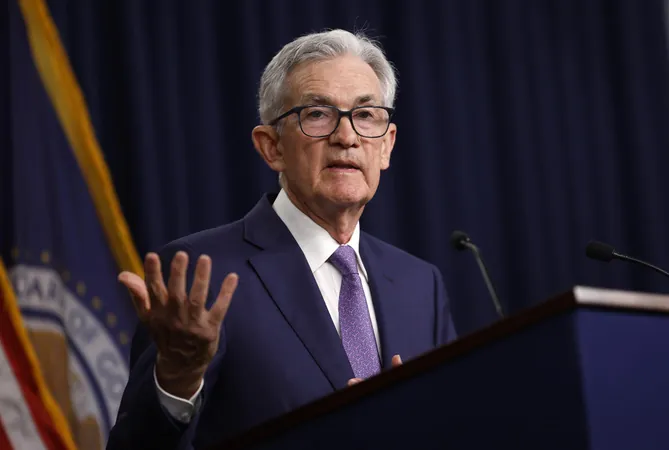
Federal Reserve's Upcoming Rate Cut Sparks Investor Anxiety: What Experts Predict
2024-09-17
Introduction
As the Federal Reserve prepares to cut interest rates, investors are expressing concerns about potential market instability, urging a careful and gradual easing approach to maintain economic confidence.
Caution from Experts
At the Future Proof festival in California, David Kelly, the chief global strategist at JPMorgan Asset Management, emphasized that the Fed's aggressive moves could "freak people out." He likened the need for caution to the delicate process of lowering a piano from a tall building: "If they cut rates aggressively here, they're going to undermine confidence," he warned in an interview with Yahoo Finance.
Federal Open Market Committee Meeting
This pivotal meeting of the Federal Open Market Committee (FOMC) signifies the conclusion of years spent tightening monetary policy to combat inflation. According to the latest Consumer Price Index (CPI), inflation has increased by only 2.5% year-on-year as of August, the lowest rate since 2021, which brings it closer to the Fed's target of 2%.
Wall Street's Divide
Wall Street remains divided on the degree of the Fed's intervention, debating whether to cut rates by 25 or 50 basis points. Kelly maintains an optimistic outlook, asserting that despite anticipated slow growth, the likelihood of a significant economic downturn remains low. He stated, "In the end, you've got to give me a reason why consumers stop spending, and I think it takes a lot to make American consumers stop spending."
Consumer Resilience
Recent retail sales data reflects resilience among consumers, showing a surprising 0.1% increase in August, alongside a revision of July sales that rose to 1.1%. This comes against a backdrop of a labor market showing signs of strain, with fewer jobs added than expected in August.
Expert Predictions
Saira Malik, president of Nuveen's equities and fixed income division, pointed out the caution urged by experts, asserting that the prolonged cycle of high inflation and rising rates will eventually impact consumers. She anticipates an economic recession could emerge in 2025.
Echoing these cautious sentiments, Bryan Whalen, chief investment officer at TCW’s fixed income group, indicated that while the Fed’s shift in policy may delay a downturn, it’s unlikely to prevent it altogether. "Whether it’s going to be a mild recession or a moderate one depends largely on how the Fed reacts and what unfolds in the capital markets," he said.
Investor Portfolio Reevaluation
In light of these shifts, investors are reevaluating their portfolios to align with the anticipated new interest rate environment. With rising interest rates in recent years driving up the demand for cash and short-term assets, strategists at Future Proof suggest now is an opportune moment to reassess positions ahead of the Fed's rate cuts.
Reinvestment Risks
Lauren Goodwin, chief market strategist at New York Life Investments, highlighted that "reinvestment risk is now an investor's biggest problem and threat." Meanwhile, Callie Cox, chief market strategist at Ritholtz Wealth Management, urged investors to pay attention to the declining rates. "Lock in rates now and understand why you’re holding cash where you are," she advised.
Diversification Strategies
Cox also encouraged clients to diversify their portfolios, stating, "Now is the time to invest in risk assets, especially if you're a long-term investor who can tolerate the market's swings." Amid the ongoing debate, traditional portfolio allocations—typically 60% stocks and 40% bonds—are being reevaluated, with experts suggesting an evolution to a 50-30-20 distribution that includes alternatives.
Long-term Perspectives
Kelly added that international diversification and alternative investments, like infrastructure and real estate, could yield better long-term returns. He remarked on the diminishing returns from the conventional 60-40 portfolio after periods of significant growth in the markets.
Whalen contended that regardless of the economic climate, bonds should remain a staple in any investment strategy. He predicted, “If the Fed succeeds in averting a recession, your investment-grade corporate bond fund is probably going to return you plus or minus 5%. That's not bad.”
Conclusion
As the Fed's meeting approaches, investors remain on edge, aware that the decisions made could ripple through the economy and impact their financial strategies significantly.




 Brasil (PT)
Brasil (PT)
 Canada (EN)
Canada (EN)
 Chile (ES)
Chile (ES)
 España (ES)
España (ES)
 France (FR)
France (FR)
 Hong Kong (EN)
Hong Kong (EN)
 Italia (IT)
Italia (IT)
 日本 (JA)
日本 (JA)
 Magyarország (HU)
Magyarország (HU)
 Norge (NO)
Norge (NO)
 Polska (PL)
Polska (PL)
 Schweiz (DE)
Schweiz (DE)
 Singapore (EN)
Singapore (EN)
 Sverige (SV)
Sverige (SV)
 Suomi (FI)
Suomi (FI)
 Türkiye (TR)
Türkiye (TR)